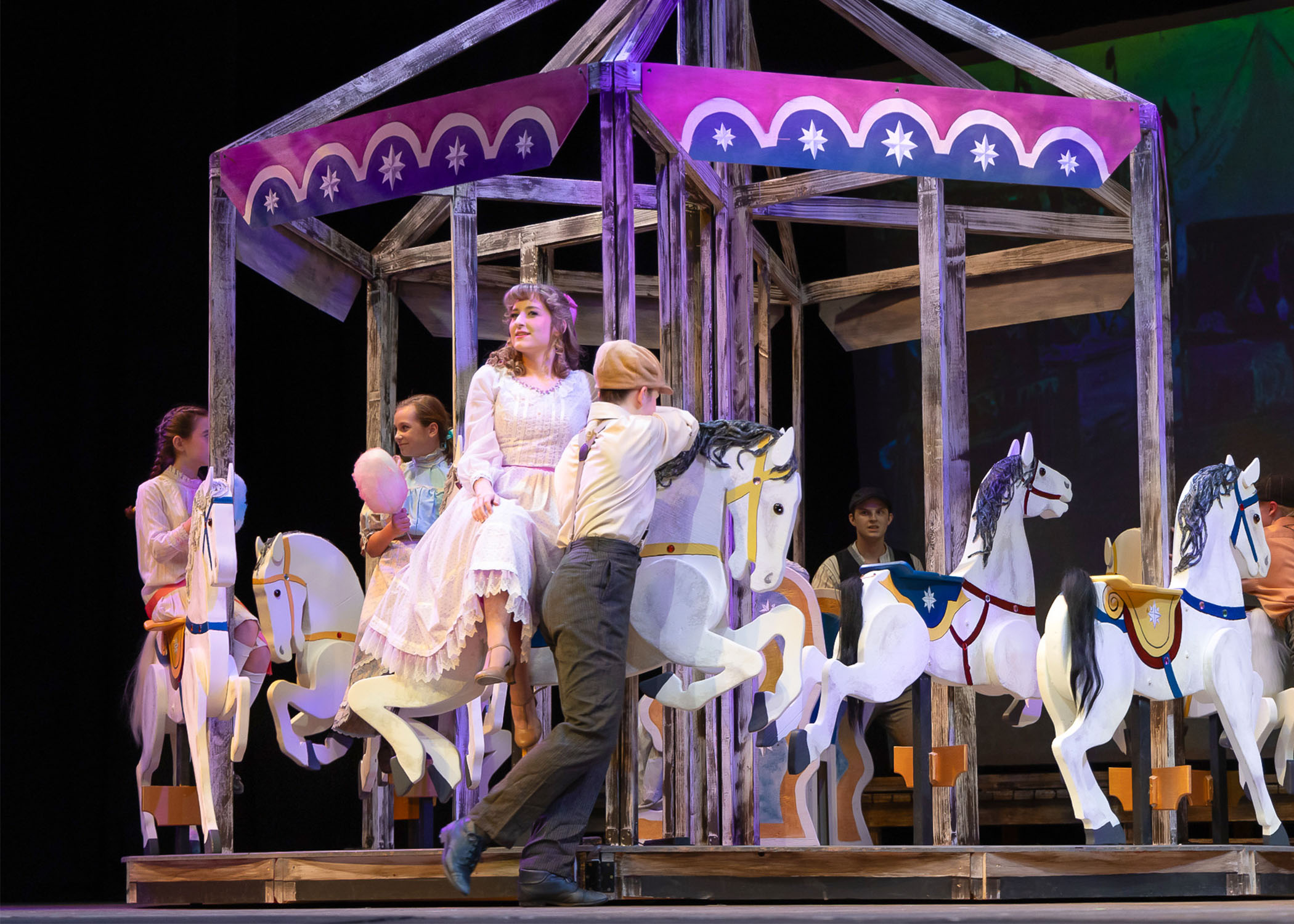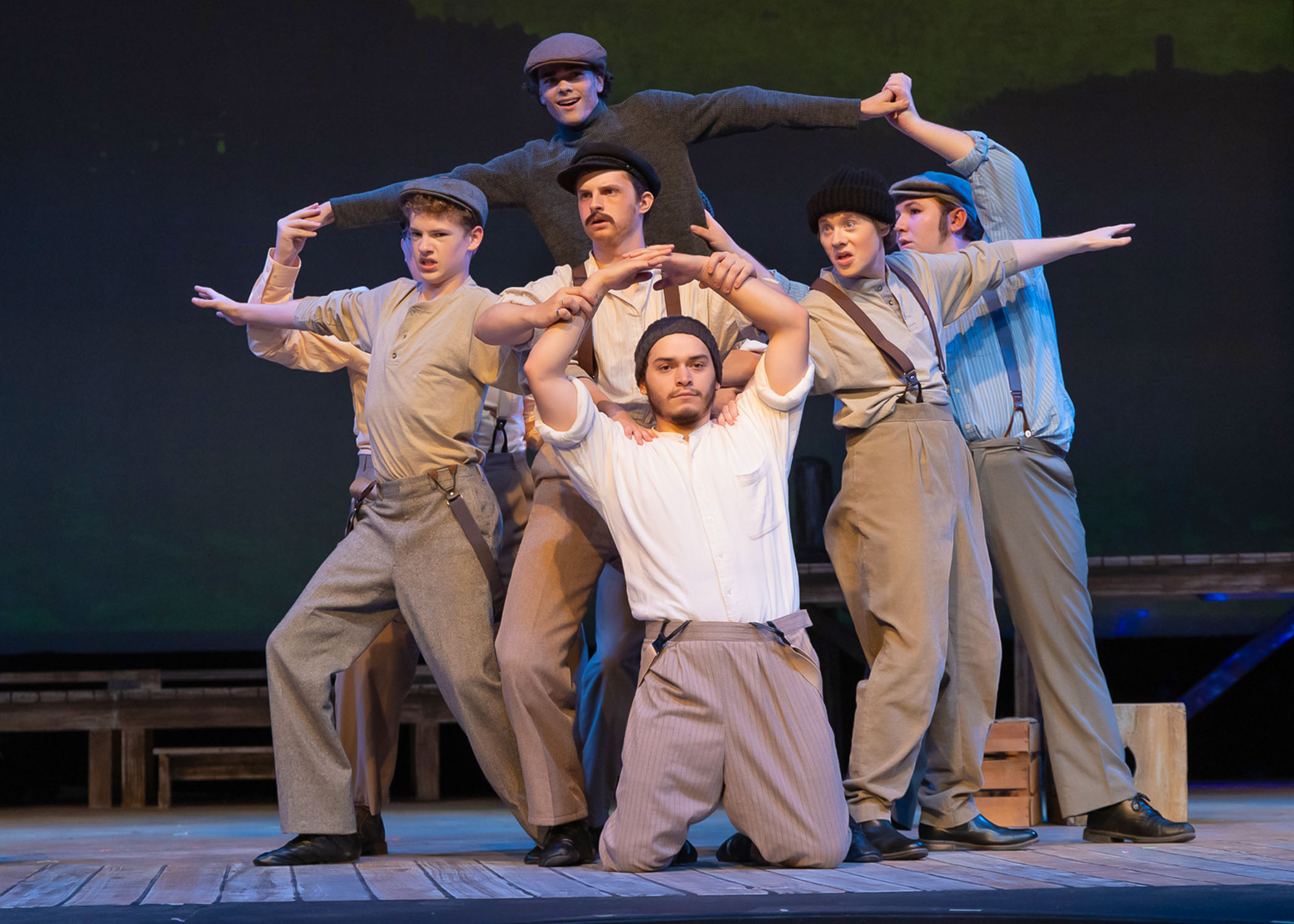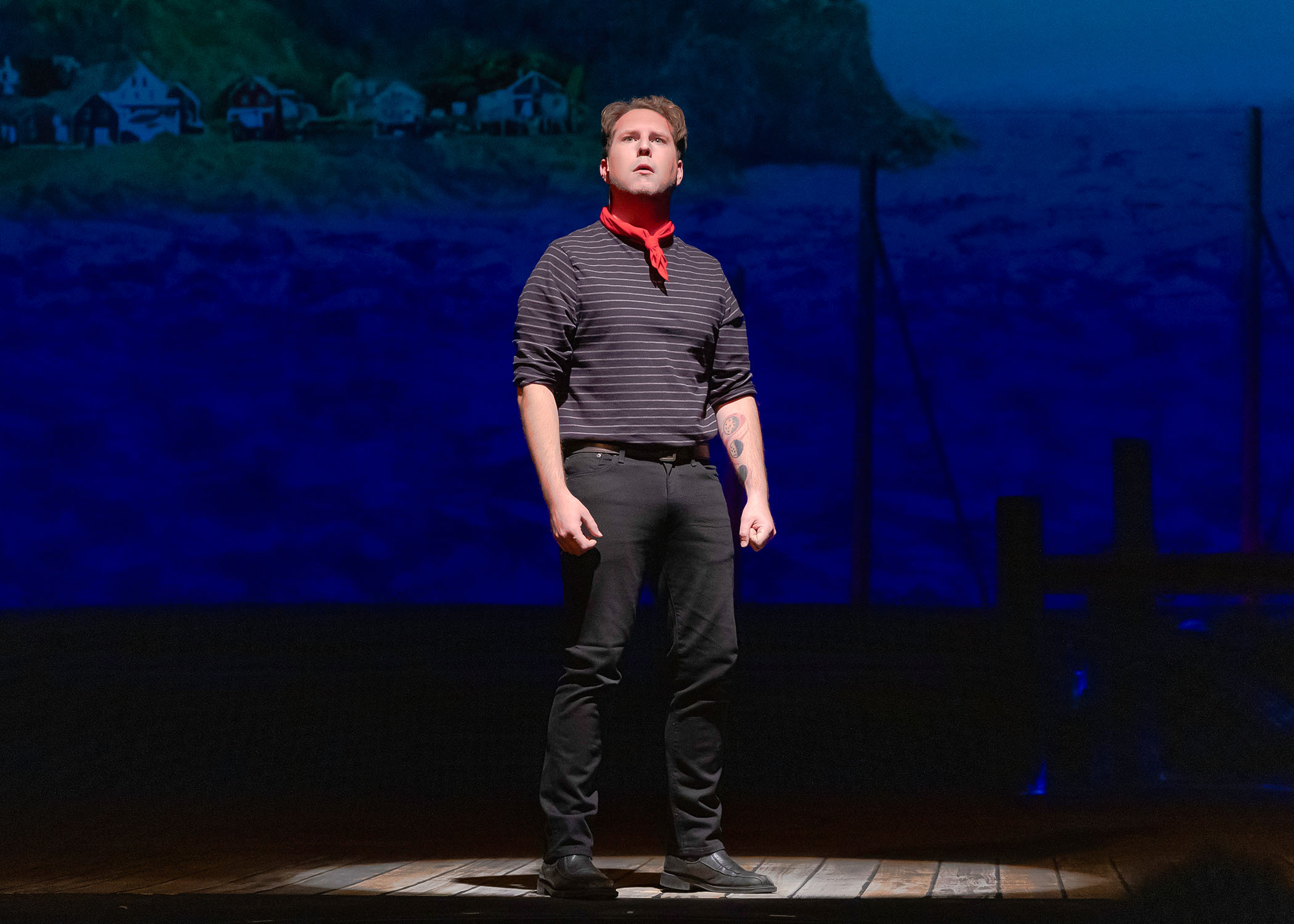
For a musical full of frothy numbers about New England steamed clams, the springtime mating habits of livestock and humans alike, and the comic perils of falling for a man who persistently reeks of herring, “Carousel” also doesn’t shy away from some serious darkness.
Written in the first part of the 20th century by iconic musical theater duo Richard Rodgers and Oscar Hammerstein II, the inherent challenge for any modern production is selling a show centered around abrasive carnival barker Billy Bigelow (Robby French), whose most trusty coping mechanism is threatening violence against women – or actually committing it.
The Spokane Civic Theatre’s production (running through Oct. 13) deals with this head on in the form of a note from the director housed not-so-discreetly under the list of musical numbers in the show’s program.
“Carousel was first produced in 1945, and while times have certainly changed since then, there are issues raised in the show that still resonate with today’s audiences,” the note from director Jean Hardie reads. “There is much to dislike and disapprove of in the character of Billy Bigelow, but also, perhaps, some understanding of how the forces of life can drive one man to self-destructive choices while another man charges forward to achieve success.”
Add onto heroine Julie Jordan’s confession that Bigelow once hit her, his – spoiler alert – suicide during a failed attempt at armed robbery to provide for his unborn child, and viewers can see that, Toto, we’re not in “Oklahoma!” anymore. The 1956 movie adaptation of “Carousel” starring Shirley Jones and Gordon MacRae tweaked Bigelow’s death to be a tragic accident, so some of the audience loudly gasped during Sunday’s matinee when Bigelow plunged his knife into his abdomen to evade arrest around the midpoint of the show.
“‘Oklahoma!’ is about a picnic; ‘Carousel’ is about life and death,” musical theater legend Stephen Sondheim famously contrasted the two Rodgers and Hammerstein shows.
The Civic’s upfront approach seemed to work, as the audience sat in rapt attention at the beautiful voices and heartfelt performances telling the story of Bigelow and his love, dreamy-eyed cotton mill worker Jordan (played by Karlin Marie Kahler, who convincingly portrayed Jordan as empathetic yet at times feisty in her own right, rather than simply subservient to Bigelow).
Based on a relatively obscure turn-of-the-century Hungarian play (Ferenc Molnár’s “Liliom”), the 1873 Maine translation of “Carousel” shows us what happens when two working-class people fall in love, lose their jobs and try to support a new baby while wrestling with a shared fear of intimacy. After all, Bigelow and Jordan marry within a few months of meeting, yet even after saying those vows, have yet to say, “I love you.”

Once Bigelow dies, he’s offered a promotion from his new gig in purgatory by helping their daughter Louise (Hailey Stroh), now 15 and the town outcast, overcome the anger and isolation she inherited from her father’s shameful reputation.
Louise’s “Ballet” uses dance alone to convey the sad legacy of inherited trauma. Like her father, Louise is ridiculed by the upper classes in town and nearly resorts to violence when their taunting becomes too much; like her mother, she is wooed but ultimately abandoned by a charming carnival worker. The dancers/actors did a fine job getting this message across without words, delivering some impressive moves in the process.
As Hardie said, the largely surly and unpleasant Bigelow is a difficult character to like; the show would benefit from an extra scene (or even just one good line) showing why Jordan fell for him in the first place (“You’ve been so good to me,” she tells an incredulous Bigelow when they first fall in love, but the old writing adage of “Show, don’t tell” mostly escapes the original show). Still, French seems so natural in his role, even maintaining the perfect micro-facial expressions when another performer is center stage, that Bigelow’s humanity comes through without the help of the script.
The lengthy powerhouse “Soliloquy,” in which Bigelow belts out his determination to provide for his unborn daughter (after daftly presuming for the first half of the song that he’d automatically have a son – and perhaps even more daftly assuming that meant parenthood would be as breezy as the shores of Maine), did not disappoint. French has one of those voices that, at least considering Bigelow’s tough, quasi-New York accent (he is said to have come up to Maine from Coney Island), almost seems too melodic and agile to come out of the same mouth that delivered such gruff speech.

As for the overall production, costumes were beautiful and, at least to this eye, authentic. There were times some actors’ microphones were a bit unreliable – a disappointment because they all have such solid voices. But set design was fun, with one gig in particular involving some modest beach shacks transforming into the namesake carousel for which Bigelow works impressing the audience.
Other standout performances included Elizabeth Theriault as Jordan’s upwardly mobile yet well-meaning friend Carrie Pipperidge. Her voice is lovely, and she used convincing comedy chops to endear the audience to Pipperidge, who in the wrong hands could come across an insufferable airhead. Playing her nouveau riche fishmonger love interest, Enoch Snow, Nathan Hoyt also wowed with his powerful tenor, especially during “Mister Snow (Reprise).”
The dual romances of Jordan-Bigelow and Pipperidge-Snow seem intended to make a point about Bigelow’s worth; no relationship is perfect, and while he certainly has no excuse for his anger management problem, Bigelow professes his genuine love for Jordan by the show’s end. In contrast, Snow is mild-mannered and a good provider, yet stuffy and judgmental in a way that makes the viewer question his true feelings for Pipperidge, whom he dumps early on in their courtship over a silly misunderstanding that he took for her being “loose.” They eventually reconcile and have a whopping nine children, but the cracks in their marriage are still evident after the show’s 15-year time jump.
“You can see that people are people, and it’s unfair to condemn Julie and say, ‘Well, she was such a victim, and he was just an all-bad person,’” Hardie earlier told The Spokesman-Review. “I think that they show you the light and the shade in both Billy and Julie, and a little bit even in Carrie and Enoch. It’s universal. People still struggle with these same issues, and we probably always will.”
Still, it’s difficult to watch Jordan tell her daughter near the end of the show that someone’s blow can feel as gentle as a kiss (arguably one of its most poorly aged blunders). But if one is able to wash away the specifics and look at the line through a broader lens, there is a message of empathy and nuance – that the people we love still make mistakes, and somehow we love them anyway – that can be cathartic to hear.
If You Go
‘Carousel’
When: Through Oct. 13. 7:30 p.m. Wednesdays through Saturdays; 2 p.m. Sundays. Saturday Oct. 12 performance at 2 p.m.
Where: Spokane Civic Theatre, 1020 N. Howard St.
Cost: $41/adults, $36/military and seniors, $15/students. Tickets available through spokanecivictheatre.com
Read the full article here
Article by Alayna Shulman
Photos by Marlee Melinda Andrews

